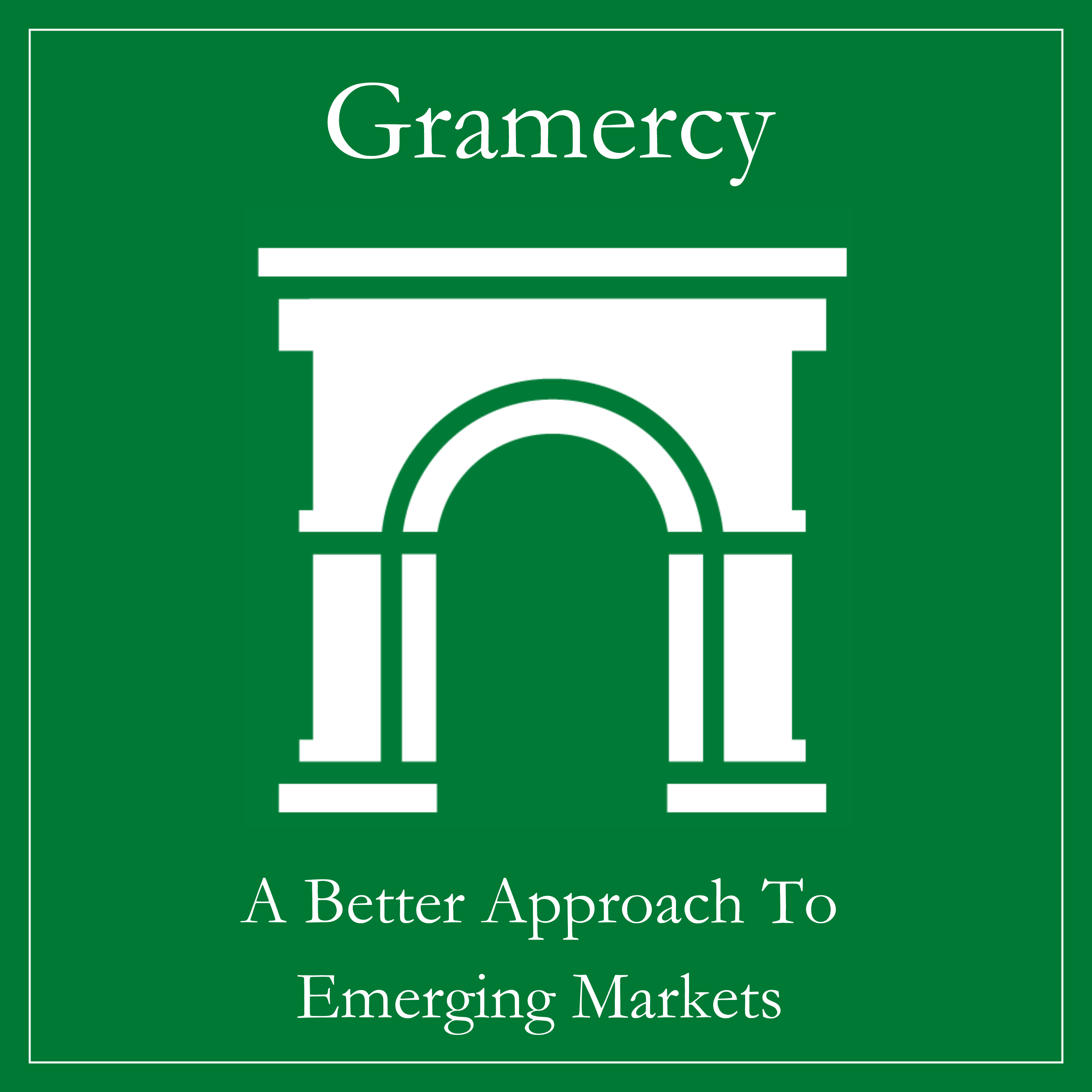Contents
Market Overview
Macro Review
After ongoing economic uncertainty and geopolitical turmoil, this week’s developments brought a little more clarity around market risk, U.S. policy and the Middle East.
First, there were signals from the incoming Trump Administration of a possible gradual, rather than one-off, approach to introducing U.S. tariffs on imports, which could mitigate inflation risk and retaliation by trading partners.
This was followed by U.S. CPI inflation data coming in slightly lower than expected, as well as lower-than-expected December CPI in the UK. The week finished with a landmark ceasefire between Israel and Hamas, as well as Q4 China GDP growth that came in above consensus.
Arguably, the most closely watched indicator this week in U.S. markets was the CPI data, which showed core inflation slowing to 0.23% month-over-month in December. This broke its streak of 0.3% increases and was led by weaker core goods prices. The data, followed by Governor Waller’s relatively dovish comments suggesting that a March rate cut cannot be ruled out, reversed the 10-year U.S. Treasury yield’s increases, allowing them to end 17bps lower on the week. This end to the week came despite a solid December retail sales figure in which control group sales were modestly stronger than expected.
Investors will continue to closely focus on U.S. inflation and labor market data going forward, with the former still well above the Fed’s 2% year-over-year target (December headline CPI at 2.9%, core CPI at 3.2% and core PCE expected at 2.8% on January 31). In terms of expected rate moves this year, markets are currently pricing in around 40bps rate cuts from the Fed, 100bps cuts from the ECB and 65bps cuts from the BoE. EM central banks are hoping for an increase in Fed rate cut expectations into 2025. This week, Poland, Romania, and Korea were on hold, but Indonesia delivered a surprise rate cut to support domestic growth.
Another notable development this week was a new wave of U.S. sanctions targeting Russia and focused on the energy sector, which caused oil prices to rally (WTI up 4.5% on the news, reaching $80). However, oil markets gave up half of those gains at the end of the week as Trump Administration nominees discussed the need to implement policies to lower consumer prices.
EM Credit Update
Emerging market sovereign credit (cash bonds) ended the week up +0.7% with credit spreads 3bps wider. Emerging market corporate credit also ended the week up +0.4% with credit spreads wider by 9bps. For the first time in quite some time, investment grade outperformed high yield marginally. Looking at individual sovereigns, Romania and Senegal stand out as some of the weekly underperformers due to the budget concerns in the former and outstanding IMF debt auditing requests for the latter. Lebanon continued to be an idiosyncratic story, outperforming on the “peace dividend,” with some bondholders also reportedly looking to engage with authorities on a potential restructuring.
There were four main topics in EM credit this week:
First, there were continued positive developments in Argentina with leadership confident enough to reduce the ARS vs. USD depreciation rate from 2% to 1% per month.
Second, we saw better sentiment in Brazil, with media quoting Brazilian officials saying they are listening to concerns of financial market participants regarding fiscal plans.
Third, attention was on Ukraine as Trump officials commented on prospects for a peace deal.
Fourth, China’s higher than expected Q4 GDP number helped boost its 2024 real GDP growth rate to the government’s 5% target. The challenge for China this year will be to sustain the pick-up in consumption growth with fiscal and monetary policy measures, while dealing with likely U.S. tariffs on much-needed exports that accounted for around a quarter of China’s real growth in 2024.
On the new issue front, following a busy previous week, EM sovereign bond issuance made way for EM corporate bonds. Corporates faced a generally constructive backdrop from investors, helping keep up the relatively positive tone in EM fixed income, despite continued reports on dedicated-EM fund outflows. In the EM sovereign space, Benin was able to come to market as the first issuer out of Africa, while Angola was able to increase the size of its collateralized loan from a major U.S. bank.
The Week Ahead
All eyes will be on the Trump inauguration and the pace of subsequent changes to U.S. geopolitical, trade and economic policies.
With the U.S. holiday on Monday, the data week starts off watching whether China’s commercial banks are guided by the PBoC to cut their prime rates (for corporate and mortgage lending). The consensus does not think so and believes there is room for surprise given the upcoming Chinese New Year and liquidity needs. Turkey’s Central Bank meets on January 23rd, with consensus looking for a 250bps rate cut.
Otherwise, we have a relatively quiet U.S. data week ahead until Friday, January 24th, when the University of Michigan Consumer Sentiment is released, and PMI is released in the U.S. and Europe. It’s also when the BoJ is expected to hike its rate by 25bps to 0.50%. Markets will remain interested in CPI releases across the world, with Canada, New Zealand, and South Africa expected to release next week.
Fixed Income
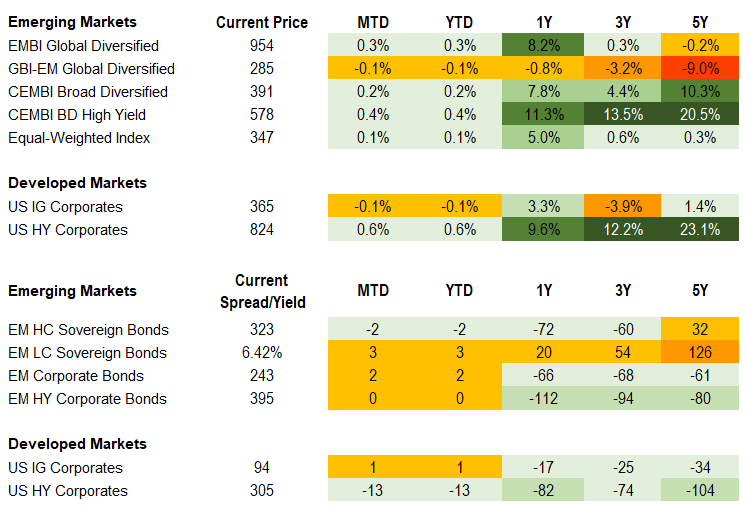
Equities
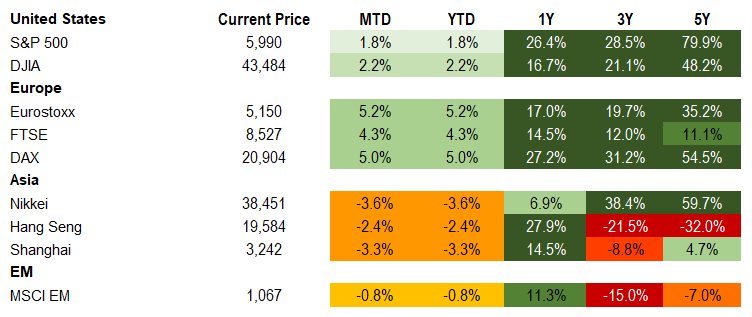
Commodities

Source for data tables: Bloomberg, JPMorgan, Gramercy. EM Fixed Income is represented by the following JPMorgan Indicies: EMBI Global, GBI-EM Global Diversified, CEMBI Broad Diversified and CEMBI Broad High Yield. DM Fixed Income is represented by the JPMorgan JULI Total Return Index and Domestic High Yield Index. Fixed Income, Equity and Commodity data is as of January 17, 2025 (mid-day).
Country Highlights
Venezuela, Argentina, and Romania were in focus this week, with U.S. Secretary of State nominee Marco Rubio delivering a hawkish foreign policy message on Venezuela, the International Monetary Fund completing a review of Argentina’s funding facility, and Romania approving election rules.
U.S. Secretary of State nominee Marco Rubio delivers a hawkish foreign policy message on Venezuela
Gramercy Comment: We see the White House, rather than the State Department, as most likely to drive U.S. policy on Venezuela. The confirmation hearings for Rubio, a longstanding critic of the regime in Venezuela, came just days after President Nicolas Maduro was again inaugurated, despite widespread acceptance in the international community that he stole the July 2024 election and his new term in office is seen as illegitimate. This is a view shared by some of Venezuela’s closest regional partners such as Colombia and Brazil. However, Maduro remains in full control of Venezuela’s institutions and security apparatus.
In this situation, we see two main scenarios for U.S. policy on Venezuela at the start of the Trump 2.0 administration. One is a return to the “maximum pressure” approach of the previous Trump Administration that seems to be favored by Rubio but has failed to produce regime/political change in Caracas and has been criticized by Mr. Trump. The other is a more pragmatic approach that recognizes Maduro’s de facto political control on the ground, engages his government in advancing some of the Trump team’s main policy priorities on immigration and energy security, and keeps Venezuela open for U.S. business on a case-by-case basis with a continuation of ad hoc oil sector licenses. Which of the two philosophies prevails depends on whether the hawks or the pragmatists on Venezuela have the President’s ear at the start of his term.
We are of the view that the balance of incentives and Mr. Trump’s inclination to pursue “deals” favors the latter camp, but we also caution that uncertainty is likely to remain elevated in the near-term when it comes to Washington’s policy on Venezuela.
IMF Completes Review of Argentina’s 2022 Extended Funded Facility
Event: Last week, the IMF published its Ex-Post Evaluation of Exceptional Access under the 2022 Extend Funded Facility (EFF). The review emphasized the significant improvement in 2024 program performance, given current authorities’ strong commitment to fiscal adjustment and the positive impact on inflation. This contrasts with the country’s underperformance in 2022-2023, due to lagging reform implementation and large adverse shocks. Further reflection is needed on the Fund’s approach to countries with extensive balance of payment problems, which cannot be resolved with a singular program.
Additional areas of reflection included shortcomings with the technical assistance provided ahead of the 2020 restructuring outside of a formal program, repeated review approvals despite ‘temporary’ FX controls, possible contingency measures when program risks are high, and how the Fund and its shareholders deal with political pressure.
Gramercy Comment: The findings of the Ex-Post review were not surprising, and its completion is a positive step in the process to reach an eventual new deal with the Fund. We would expect a new program to entail more sustainable fiscal adjustment, a path to unwind FX controls, and evolution of monetary policy towards positive real rates. The Central Bank’s reduction in the crawl from 2% to 1%, combined with the authorities’ input to the Ex-Post review, indicates that the government sees the current FX regime as a component of the better inflation path.
While we do not expect this to change materially ahead of the mid-terms in August, we think authorities would have a willingness to evolve their stance in a stronger economic and political context.
Romania Approves Dates and Media Campaign Rules for Presidential Vote
Event: The government approved May 4th and May 18th as the new dates for the first and second rounds of the presidential elections. This approval follows the Constitutional Court’s annulment of the first-round vote held last November, and cancellation of the previously scheduled second round on election interference. Authorities also announced new campaign rules for social media platforms to prevent outside interference. Companies could face fines if content in violation of the rules is not removed within the specified timeframe. Over the weekend, protests organized by the far right demanded reversal of the Constitutional Court’s decision and called for the resignation of outgoing President Klaus Iohannis.
Gramercy Comment: We expect Romania’s political backdrop to remain uncertain in the run-up to the May vote while investors await the 2025 budget presentation and approval. The formation of a government despite a more divided parliament, coupled with approval of stop-gap fiscal measures late last year, were constructive steps to address fiscal consolidation and political concerns. However, more steps will be needed to fend off market and rating pressure. Fitch recently revised the outlook on Romania’s BBB- rating to negative, citing political uncertainty and adverse implications for fiscal accounts, with debt set to exceed the BBB median level by 2026. We think the roughly 2% of GDP of fiscal measures that were passed at year-end, including wage and pension freezes, were in part catalyzed by Fitch’s negative outlook revision.
While politics are fragile and complicate the outlook, we think market pressure, rating risk and stalled EU funds are strong incentives for the government to improve fiscal policy.
Emerging Markets Technicals
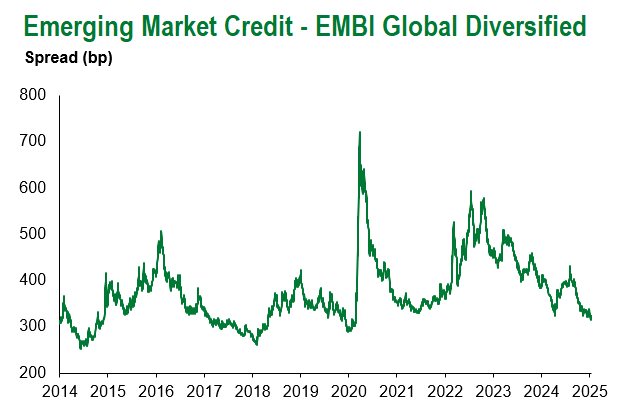
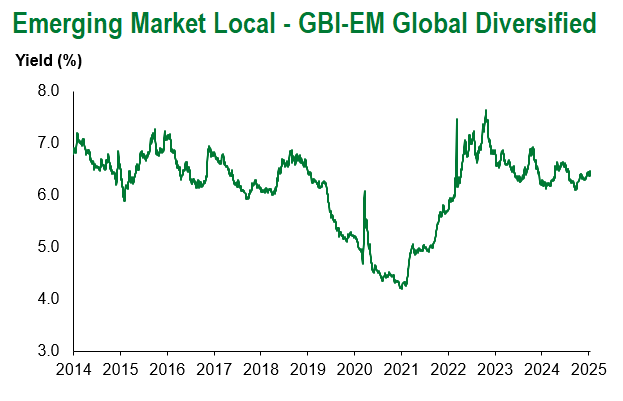
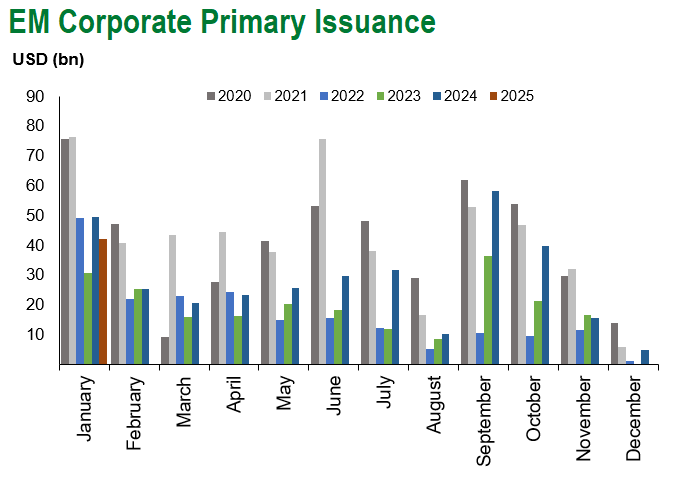
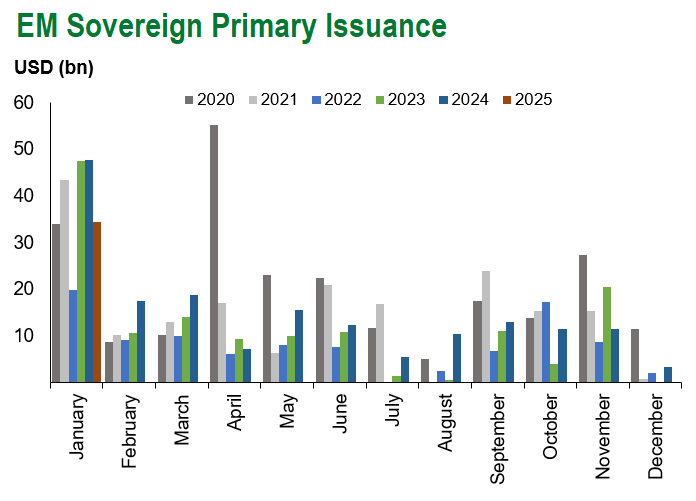
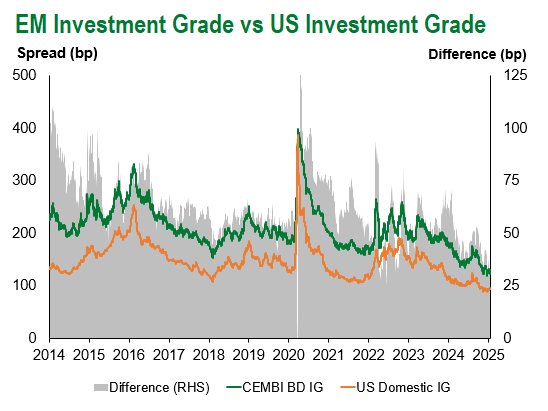
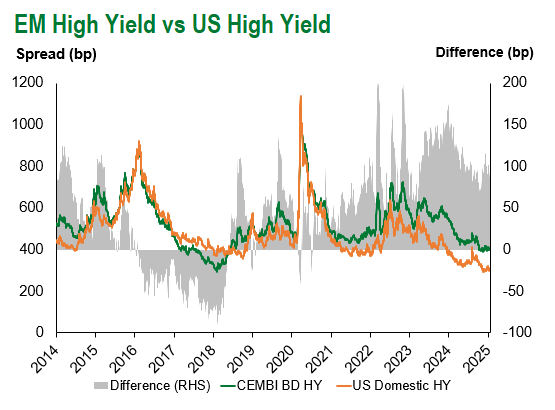
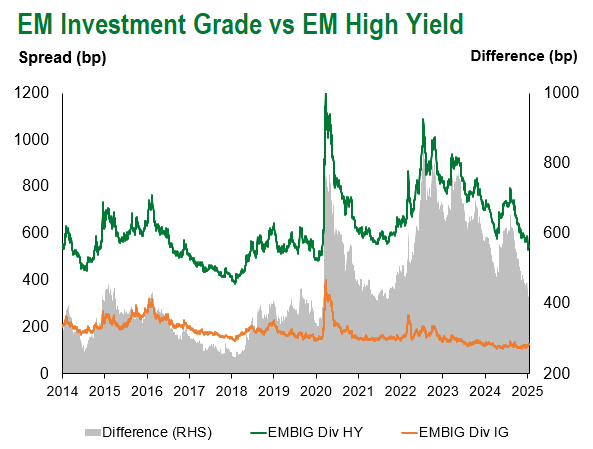
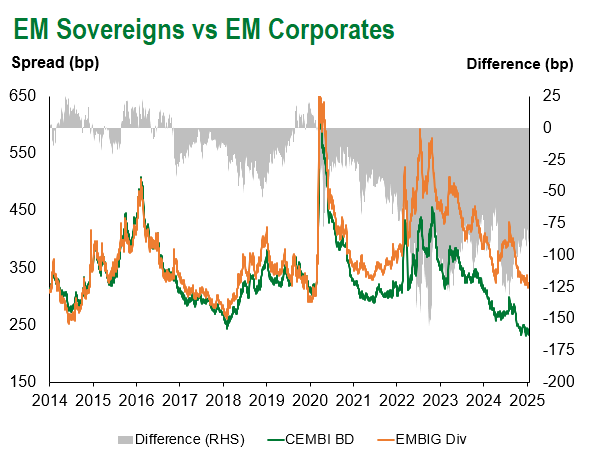
Emerging Markets Flows
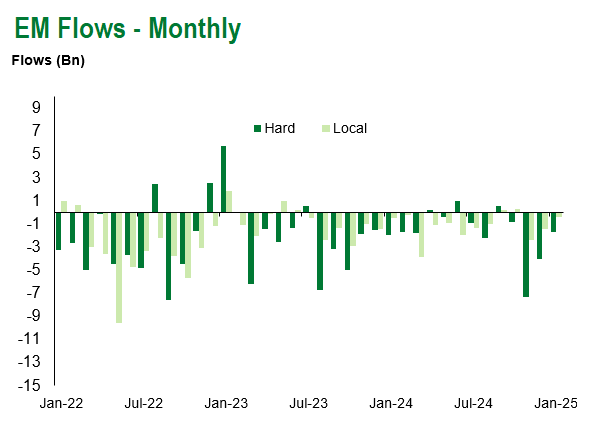
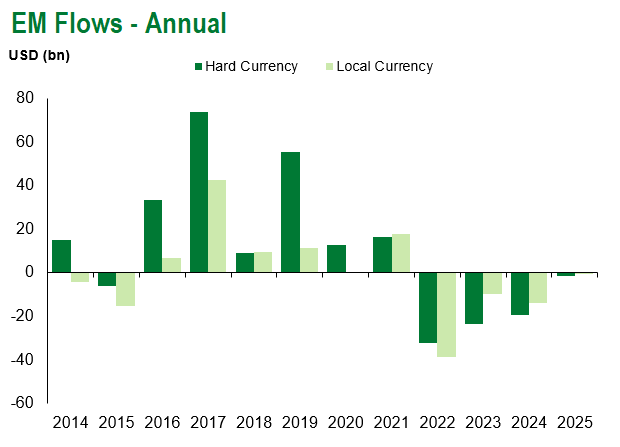
Source for graphs: Bloomberg, JPMorgan, Gramercy. As of January 17, 2025.
For questions, please contact:
Simon Quijano-Evans, Managing Director, Chief Strategist, [email protected]
Kathryn Exum, CFA ESG, Director, Co-Head of Sovereign Research, [email protected]
Petar Atanasov, Director, Co-Head of Sovereign Research, [email protected]
This document is for informational purposes only. The information presented is not intended to be relied upon as a forecast, research or investment advice, and is not a recommendation, offer or solicitation to buy or sell any securities or to adopt any investment strategy. Gramercy may have current investment positions in the securities or sovereigns mentioned above. The information and opinions contained in this paper are as of the date of initial publication, derived from proprietary and nonproprietary sources deemed by Gramercy to be reliable, are not necessarily all-inclusive and are not guaranteed as to accuracy. This paper may contain “forward-looking” information that is not purely historical in nature. Such information may include, among other things, projections and forecasts. There is no guarantee that any forecasts made will come to pass. Reliance upon information in this paper is at the sole discretion of the reader. You should not rely on this presentation as the basis upon which to make an investment decision. Investment involves risk. There can be no assurance that investment objectives will be achieved. Investors must be prepared to bear the risk of a total loss of their investment. These risks are often heightened for investments in emerging/developing markets or smaller capital markets. International investing involves risks, including risks related to foreign currency, limited liquidity, less government regulation, and the possibility of substantial volatility due to adverse political, economic or other developments. References to any indices are for informational and general comparative purposes only. The performance data of various indices mentioned in this update are updated and released on a periodic basis before finalization. The performance data of various indices presented herein was current as of the date of the presentation. Please refer to data returns of the separate indices if you desire additional or updated information. Indices are unmanaged, and their performance results do not reflect the impact of fees, expenses, or taxes that may be incurred through an investment with Gramercy. Returns for indices assume dividend reinvestment. An investment cannot be made directly in an index. Accordingly, comparing results shown to those of such indices may be of limited use. The information provided herein is neither tax nor legal advice. Investors should speak to their tax professional for specific information regarding their tax situation.
